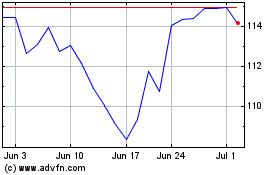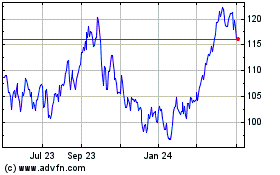GE, Exxon CEOs Raise Concerns About Climate Risk -- Update
March 30 2017 - 9:50AM
Dow Jones News
By Thomas Gryta and Bradley Olson
General Electric Co. CEO Jeffrey Immelt defended efforts to
reduce emissions and fight climate change, after President Donald
Trump reversed rules that pushed U.S. utilities to use
cleaner-burning fuels.
In a blog post to employees Wednesday, Mr. Immelt highlighted
the administration's move and said climate change "should be
addressed on a global basis through multi-national agreements" such
as the 2015 Paris Agreement. The U.S. hasn't withdrawn from that
agreement, but the executive order has raised concern it will be
hard to reach the pact's targets.
"We believe climate change is real and the science is well
accepted," Mr. Immelt wrote. "We hope that the United States
continues to play a constructive role in furthering solutions to
these challenges."
Mr. Immelt has managed to avoid conflict with President Trump,
who has been known to lash out at companies, especially on Twitter.
The GE leader visited the White House in February and supports some
administration policy plans, such as revising the tax code. He also
has defended globalization at a time when many countries are taking
a more-nationalist stance.
In the post, Mr. Immelt said companies have to "have their own
'foreign policy'" and "learn to adjust to political volatility all
over the world."
GE sells turbines for coal- and gas-fired power plants as well
as wind turbines. It has a business unit called Current focused on
energy savings. He said the conglomerate has spent $20 billion in
research on reducing emission, improving energy efficiency and
cutting cost since 2005.
Mr. Trump's order begins a review of former President Barack
Obama's Clean Power Plan, which would have required utilities to
reduce power-plant carbon-dioxide emissions to 32% below 2005
levels by 2030.
The order could extend the life of older coal-powered plants but
likely will trigger legal and political challenges. Mr. Immelt
acknowledged the order is the beginning of long process with
uncertainty around how it will be implemented.
"Industry must now lead and not depend on government," he
wrote.
Exxon Mobil Corp. Chief Executive Darren Woods has also publicly
supported the Paris climate deal. Shortly after taking over from
Rex Tillerson, who stepped down to become secretary of state, Mr.
Woods wrote in a blog post that "climate risks warrant action and
it's going to take all of us -- business, governments and consumers
-- to make meaningful progress." The Paris deal is "an effective
framework" for dealing with rising emissions, he said.
Days before last week's executive order, Exxon reiterated this
position in a letter to White House energy adviser George David
Banks. Exxon supports the deal in part because it includes pledges
to reduce emissions from "developed and developing" countries,
unlike the Kyoto Protocol climate deal, the letter said. Then-Exxon
Chief Executive Lee Raymond famously spoke out against the 1997
treaty, which President George W. Bush eventually declined to
implement.
"We believe that the United States is well positioned to compete
within the framework of the Paris Agreement, with abundant
low-carbon resources such as natural gas, and innovative private
industries, including the oil, gas and petrochemical sectors," said
Peter W. Trelenberg, an Exxon manager of environmental policy and
planning.
Mr. Trelenberg made note of how the use of natural gas in
electric power generation has reduced emissions significantly and
said these results could be replicated globally. He also said the
U.S. would be well served to remain a part of the Paris deal to
ensure a "level playing field" in global energy markets.
Write to Thomas Gryta at thomas.gryta@wsj.com and Bradley Olson
at Bradley.Olson@wsj.com
(END) Dow Jones Newswires
March 30, 2017 09:35 ET (13:35 GMT)
Copyright (c) 2017 Dow Jones & Company, Inc.
Exxon Mobil (NYSE:XOM)
Historical Stock Chart
From Aug 2024 to Sep 2024

Exxon Mobil (NYSE:XOM)
Historical Stock Chart
From Sep 2023 to Sep 2024
